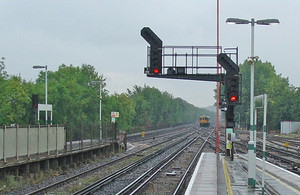Report 18/2016: Two signal passed at danger incidents
RAIB has today released its report into SPAD incidents at Reading Westbury Line Junction, 28 March 2015, and Ruscombe Junction, 3 November 2015.

Library image of four-aspect junction signal arrangement
Summary
At 08:22 hrs on 28 March 2015, a freight train running from Acton to Westbury, operated by DB Schenker Rail (UK), passed a signal at danger at Reading Westbury Line Junction, to the west of Reading station. A similar incident occurred at 06:11 hrs on 3 November 2015 when another freight train forming the same service from Acton to Westbury, and operated by the same company, passed a signal at danger at Ruscombe Junction, about seven miles east of Reading. RAIB began an investigation into both of these incidents following the latter event at Ruscombe Junction, owing to the similarities between them.
Both incidents occurred because the train drivers involved were too fatigued to properly control their trains; both drivers stated that they momentarily fell asleep on the approach to the signals concerned. They were suffering from fatigue because they had not obtained sufficient sleep, which in part was due to the rest facilities at Acton not being fit for purpose, and because the drivers were nearing the end of a long night shift. Neither driver reported as unfit for duty, which was also causal to the incidents. The investigation identified underlying factors associated with supervision and management at the drivers’ home depot in Westbury, and with the general approach to the management of fatigue within the company.
Recommendations
As a result of this investigation, RAIB has made three recommendations covering shift planning at Westbury depot, fatigue management within the freight sector and identification of fatigue risk through data analysis.
RAIB has also identified two learning points concerning the importance of preparing for duty and reporting fatigue, and the role of napping (and facilities for such) within a fatigue risk management system.
Simon French, Chief Inspector of Rail Accidents said:
One of the roles of the Rail Accident Investigation Branch is to identify areas where existing defences against accidents are still vulnerable. This investigation highlights one such area, the contribution of fatigue to human error. Although human errors are a fact of everyday life, they are of particular concern when made by train drivers since they can result in signals passed at danger, or other dangerous occurrences.
Whilst recognising the efforts that are already being made by the freight operating companies to address this difficult issue, this investigation has revealed that there is more that can be done to identify the types of duty that are more likely to cause dangerous levels of fatigue, and the members of staff who are at particular risk. Although there are mathematical models that can be used to help managers identify high risk turns of duty, the best intelligence is likely to be gained from those who actually do the work. To be really effective a fatigue management system needs to draw on the experience of drivers and should be informed by a constructive dialogue between staff and managers on the ways that fatigue can best be managed, whilst also meeting the needs of the business. Such a collaborative approach will deliver the best results if it is based on trust, openness and a recognition that all human beings have the same basic need to be rested if they are to perform at their best. An admission of tiredness should not be seen as a weakness - it may be the unavoidable consequence of the work and home demands placed on a driver.
This report has highlighted the ‘real-world’ experience of freight train drivers. By necessity, many freight trains must operate at night and many drivers are required to work long and irregular shifts, often during night hours. This means that drivers must accommodate their sleep, home responsibilities, social life and commuting in the hours that remain – and this can be a challenge. For this reason I urge freight operating companies, their employees and trade unions to work together to find practical ways of reducing fatigue at work.
Good fatigue management requires the employer and the employee to recognise their respective responsibilities. For drivers, there is an obligation to ensure that they are sufficiently rested before taking duty, and for employers, the need to reduce fatigue-induced risk so far as reasonably practicable.
I hope that the RAIB’s recommendations and learning points will make a positive contribution to the improvement of fatigue management in the rail freight sector. They are intended to promote good practice in areas such as diagramming, rostering, napping, the use of mathematical models, methods of gathering feedback from safety critical workers on fatigue-inducing shift patterns and screening for sleep disorders. Although some of these topics are similar to those that featured in our recommendations following a previous fatigue related incident at Shap in 2010, our findings suggest that there is more to be done. None of these actions are easy, and we recognise that fatigue at work will never be entirely prevented. However, I am encouraged by the importance attached to this issue by freight operating companies and the regulator alike and I am hopeful of continued progress in this area of railway risk.
Notes to editors
- The sole purpose of RAIB investigations is to prevent future accidents and incidents and improve railway safety. RAIB does not establish blame, liability or carry out prosecutions.
- RAIB operates, as far as possible, in an open and transparent manner. While our investigations are completely independent of the railway industry, we do maintain close liaison with railway companies and if we discover matters that may affect the safety of the railway, we make sure that information about them is circulated to the right people as soon as possible, and certainly long before publication of our final report.
- For media enquiries, please call 01932 440015.